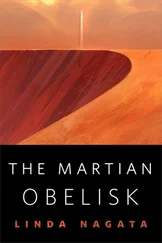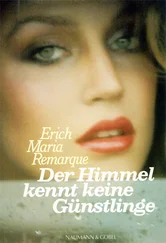She nods. “Are you coming back this evening?” Wernicke asks me.
“Yes, for the evening devotion.”
“Then come up to my room for a drink. You’ll join us too, won’t you, ladies?”
“With pleasure,” Isabelle’s mother replies. “We were going to evening devotion anyway.”
Geneviève does not reply. There is a small crease in her forehead as though she were brooding over something.
The evening is even worse than noon. There is something traitorous about the soft light. I saw Isabelle in chapel; the glow of the candles hovered over her hair. She hardly moved. The faces of the patients swung around at the sound of the organ like bright, flat moons. Isabelle was praying; she was well.
Afterward it gets no better. I succeed in meeting Geneviève at the door of the chapel and walking alone with her for a way. We go along the allée . I do not know what to say. Geneviève pulls her coat around her. “How cold the evenings are already,” she says.
“Yes. So you are leaving this week?”
“That’s what I plan. It has been a long time since I was home.”
“Are you glad?”
“Certainly.”
There is nothing more to say. But I can’t help myself—her walk is the same, her face in the darkness, the soft presentment—”Isabelle,” I say as we are about to emerge from the allée .
“I beg your pardon?” she asks in amazement.
“Oh,” I say. “That was just a name.”
For a moment she looks at me. “You must be mistaken,” she replies then. “My first name is Geneviève.”
“Yes, of course. Isabelle was someone else’s name. We talked about her occasionally.”
“So? Perhaps. One talks of so much,” she remarks apologetically. “Then you forget this and that.”
“Oh yes.”
“Was it someone you knew?”
“Yes, that was it.”
She laughs softly. “How romantic. Forgive me for not remembering at once. Now I recall.”
I stare at her. She remembers nothing, as I can see. She is lying to be polite. “So much has happened in the last weeks,” she says lightly and in a slightly superior way. “Everything gets a little confused.” And then, once more out of courtesy, she asks: “How has it been going recently?”
“What?”
“Oh that! It is over! She died.”
She stops horrified. “Died? I am so sorry. Forgive me, I didn’t know—”
“It makes no difference. I only knew her slightly anyway.”
“Died suddenly?”
. “Yes,” I reply. “But in such a way that she didn’t even know it. That counts for something.”
“Of course.” She extends her hand to me. “It really makes me very sad.”
Her hand is firm and narrow and cool—no longer feverish. It is the hand of a young lady who has been guilty of a slight faux pas and has rectified it. “A beautiful name, Isabelle,” she says. “I used to hate my given name.”
“And now you don’t?”
“No,” Geneviève says in a friendly way.
She remains friendly too. It is the odious courtesy to people in a small city whom you meet in passing and will soon forget. Suddenly I am aware of being clad in an ill-fitting suit, made by Sulzblick, the tailor, out of my old uniform. Geneviève, on the other hand, is beautifully dressed. She always was, but it has never struck me so forcibly. Geneviève and her mother have decided to go to Berlin for a few weeks before returning home. Her mother is all consideration and affection. “The theater! And the concerts! It’s always so stimulating to be in a real metropolis. And the shops! The new styles!”
She pats Geneviève’s hand. “We’ll just spoil ourselves thoroughly for once, won’t we?”
Geneviève nods. Wernicke beams. They have caught her in their net. But just what have they caught? I wonder. Perhaps it is something that is buried, hidden in each of us, but what, in fact, is it? And is it then in me too? Has it, too, been caught in a net or was it never free? Does it exist; is it something that existed before me and will exist afterward, something more important than I? Or was it only a moment of confusion that seemed profound, a distortion of the senses, an illusion, nonsense that seemed like wisdom, as Wernicke maintains? But then why did I love it; why did it leap upon me like a leopard leaping on an ox; why can I not forget it? Was it not, despite Wernicke, like opening a door in a locked room so that you could see rain and lightning and the stars?
I get up. “What’s the matter with you?” Wernicke asks. “Why, you’re as jumpy as—” he pauses and then goes on—“as the dollar exchange.”
“Oh, the dollar,” Geneviève’s mother says with a sigh. “What a misfortune! Luckily Uncle Gaston—”
I do not listen to what Uncle Gaston has done. Suddenly I am outdoors. I only remember saying to Isabelle, “Thanks for everything,” and her surprised reply: “But for what?”
Slowly I walk down the hill. Good night, sweet, wild heart, I think. Farewell, Isabelle! You have not drowned! You have flown away, or rather you have suddenly become invisible, like the ancient gods; a wave length has changed; you are still here, but you are no longer to be touched; you will always be here and you will never disappear. Everything is always here; nothing is ever destroyed. It’s just that light and shade pass over it; it is always here, the countenance before birth and after death, and sometimes it shines through what we call life and dazzles us for an instant and afterward we are never the same!
I notice that I am walking faster. I breathe deeply and then break into a run. I am wet with sweat; my back is wet. I come to the gate and then go back. I still have the same feeling; it is like a mighty liberation; every axis suddenly runs through my heart, birth and death are only words, the wild geese have been flying over me since the beginning of the world, and there are no longer any questions or any answers!
Farewell, Isabelle! Salute , Isabelle! Farewell, Life! Salute , Life!
Much later, I notice it is raining. I lift my face to the drops and taste them. Then I walk to the gate. A tall figure, smelling of wine and incense, is waiting there. We walk through the gate together. The watchman closes it behind us. “Well?” Bodendiek asks. “Where have you been? Searching for God!”
“No. I have found Him.”
He squints at me suspiciously from under his broad-brimmed hat. “Where? In nature?”
“I don’t know where. Is He to be found in special places?”
“At the altar,” Bodendiek rumbles and then, pointing to the right, “This is my way. And yours?”
“All of them are right,” I reply.
“Surely you haven’t drunk that much,” he growls behind me, somewhat startled....
As I near home someone jumps on me from behind our door. “Now I’ve got you, you swine!”
I shake him off, thinking it some kind of joke. But he is on his feet again instantly and butts me in the stomach with his head. I fall against the obelisk but manage to plant a kick in his belly: a weak kick because I am falling. The man leaps on me again, and I recognize the horse butcher Watzek. “Have you gone crazy?” I ask. “Can’t you see who I am?”
“I see all right!” Watzek seizes me by the throat. “I see you well enough, you bastard! But this is the end of you.”
I don’t know whether he is drunk, but I have no time to consider the question. Watzek is smaller than I, but he has the muscles of a bull. I succeed in carrying him over backward and pinning him against the obelisk. He lets go halfway. I throw myself and him to one side and knock his head against the foundation. He lets go completely. To make sure, I give him a blow under the chin with my shoulder, get up, go to the gate, and turn on the light. “What’s all this?” I say.
Читать дальше








